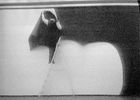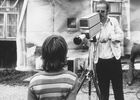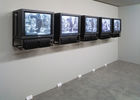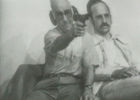Richard Kriesche
Biographie
Richard Kriesche, born in Vienna, Austria, in 1940, completed his studies of art history in 1963 and in 1964 followed suit with courses in graphic arts and painting at the Academy of Visual Arts in Vienna. In 1973, he founded the Audio-Visual Media section of the Federal Technical College in Graz, where he had been teaching since 1963. Having established the "pool" art society (1968-76), on whose behalf he edited the art journal "pfirsich" together with Horst Gerhard Haberl and Karl Neubacher, Kriesche followed this in 1973 with a media gallery called "poolerie". He is also active as a theoretician and in a number of cultural and political functions. Richard Kriesche has participated in numerous international festivals, including the Documentas 6 and 8 in Kassel, Germany, the Ars Electronica, in Linz, Austria in 1989 and 1994, as well as the 34th, 42nd, and 46th Biennales di Venezia. In his contribution to the Venice Biennale of 1995, he continued the critical approach to the media he had been fostering in his work by involving the Internet in "Telematic Sculpture 4," a kinetic work guided and directed by the users themselves, for which he received the Prize of the Biennale, the first Austrian artist so to be honored. He lives in Graz.
Additional biography
Kriesche is considered to be one of the pioneers of video art in Austria, with an accent on the analysis of the social power structures inherent in technologies. Kriesche takes a critical approach to the social contexts of the media. In his "Videodemonstration", in "Peeling Off," and in his performance piece "Kunst ist Erstellen von Kunst" (1972), and likewise in "Malerei deckt zu Kunst deckt auf" (1977), he pointed out the technical features of the medium. In "Blackout" (1974), an action happening staged during a television discussion, he attempted to demonstrate the power of the medium by keeping the camera focused on his black eye-patch. His criticism of television as a mass media is also expressed in actions such as "TV-Tod" (1974/1975/2000), where he confronted reality with its representation in the media. The social component of his media works is especially clear in works such as "14 min im Leben von..." (1977) and "Videotherapie" (1979). (Monika Vykoukal)





